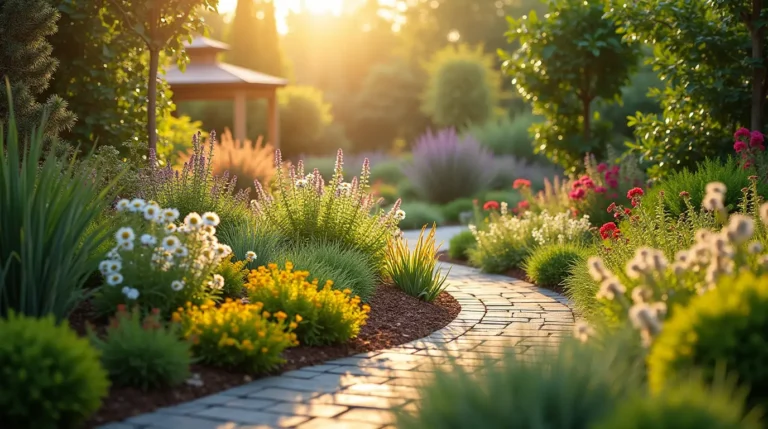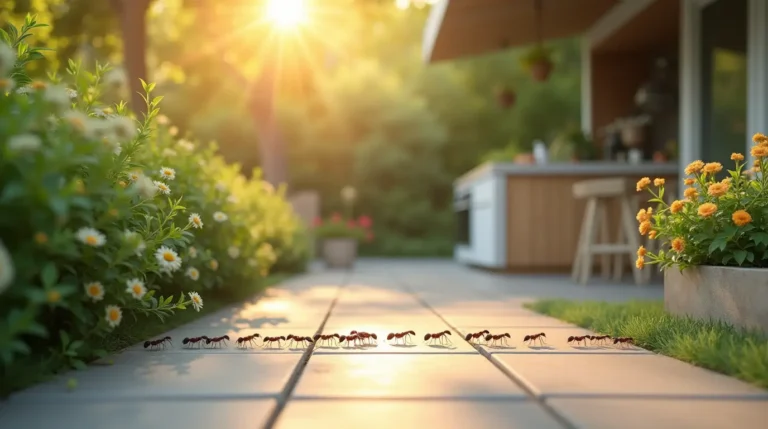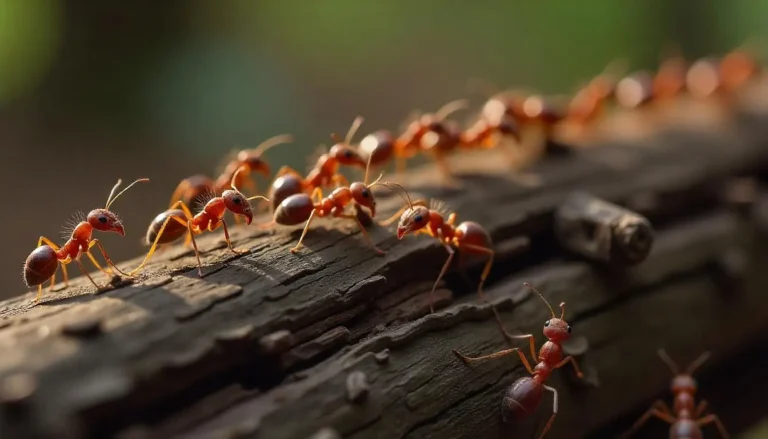Top Soil Recommendations for Winter Plants in Georgia
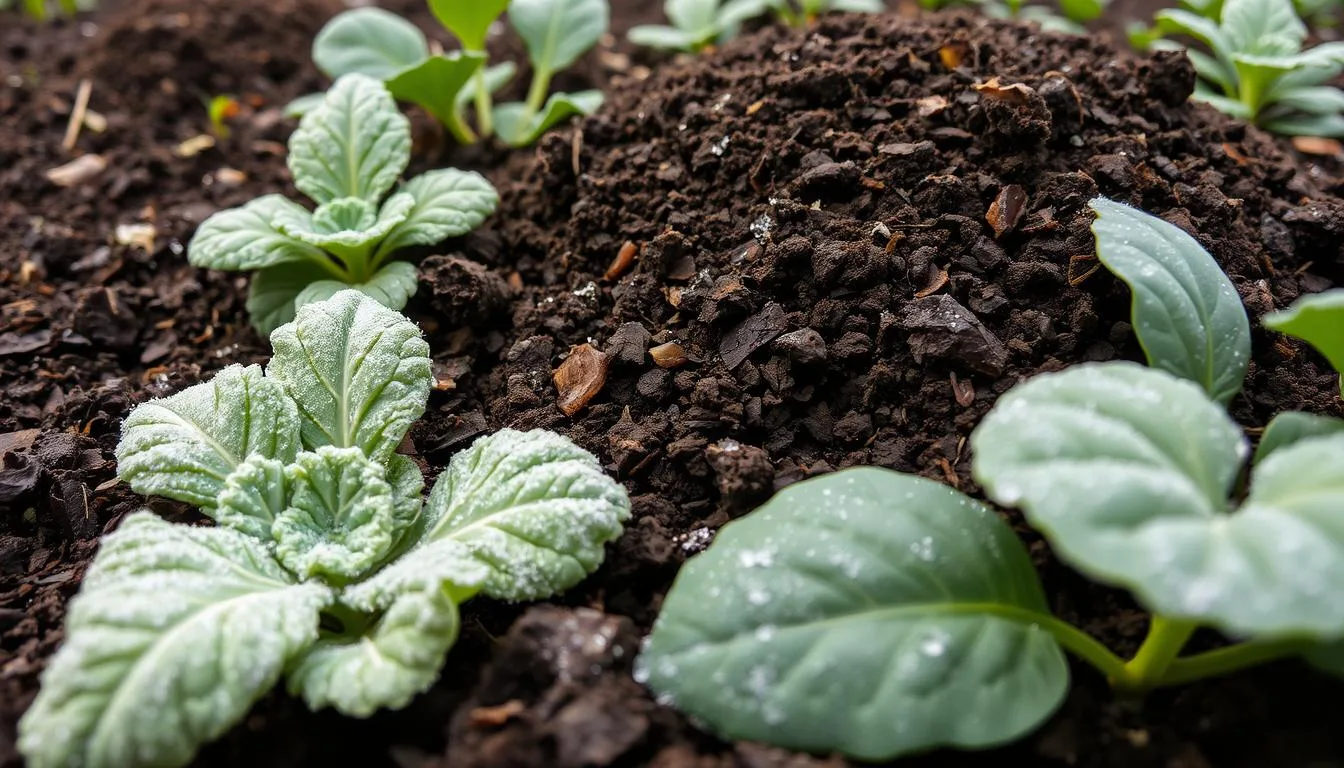
As winter approaches, the first frost dusts the landscape. It’s time to face the unique challenges of winter gardening in Georgia. Whether you’re experienced or new, soil preparation and plant protection can seem tough. But don’t worry, this guide will help you create a winter wonderland in your backyard.
I’ve lived in Georgia for a while and know how crucial the right soil is. A healthy garden starts with good soil. So, I’m excited to share my top soil picks for winter plants, based on years of experience and research.
Let’s explore the secrets of soil success together. We’ll look at Georgia’s climate, the best soil amendments, and how to protect your garden from winter. With these tips, you’ll be on your way to a winter garden that will impress everyone.
Table of Contents
Understanding Georgia’s Winter Climate and Soil Challenges
Winter gardening in Georgia needs a good grasp of the local climate and soil. Georgia’s winters see temperature swings that can harm your plants.
Temperature Fluctuations and Their Impact on Soil
Plants grow best when the temperature is between 55 and 75 degrees Fahrenheit. But Georgia’s winters can be unpredictable. This leads to dry spells and freezing ground.
These changes can make it hard for plants to get the water they need. This can cause stress and damage to the plants.
In some years, the soil may stay cool until May. This can hurt the roots of plants planted in the spring. On the other hand, plants planted in the fall get a head start on winter.
Regional Soil Characteristics in Georgia
Georgia’s varied landscape means different soils in different places. Knowing these differences is key for georgia winter plant care and georgia winter gardening tips. Soil type, pH, and nutrients all affect how plants do in the cold.
By tackling Georgia’s winter climate and soil issues, gardeners can help their plants grow well. Even in cold weather and tough growing conditions.
Best Soil for Winter Plants in Georgia
Creating the perfect soil is key for winter plants in Georgia. The soil should drain well but also hold enough moisture. Adding organic matter helps the soil hold moisture and nutrients, which is great for your winter garden.
The best pH for most winter plants is between 6.0 and 7.0. To get your soil to this range, use lime or phosphorous. These will help your plants grow well in Georgia’s climate.
| Soil Characteristic | Ideal Conditions |
|---|---|
| Drainage | Good drainage to prevent waterlogging |
| Moisture Retention | Adequate moisture-holding capacity |
| pH Range | 6.0 – 7.0 |
| Organic Matter | Incorporation of organic matter to improve soil structure |
| Soil Amendments | Addition of lime, phosphorous, and other amendments as needed |
Knowing what your winter plants need in terms of soil is crucial. By making the right adjustments, you can have a lush and productive winter garden, even in tough climates.
Essential Soil Amendments for Winter Garden Preparation
As winter comes to Georgia, getting your garden soil ready is key. The right soil amendments can make your soil better, balance its pH, and add nutrients. This helps your plants grow strong and healthy.
Organic Matter and Composting Benefits
Adding compost to your soil is a big plus for winter gardening. Compost makes the soil richer, better structured, and keeps moisture in. This is vital in the dry winter months. It helps your winter plants thrive.
pH Balancing for Winter Growth
Soil pH is important for winter plants to grow well. Georgia’s soils are often too acidic. Adding lime at 20-40 lbs per 1,000 square feet can fix this. It makes your soil better for your plants.
Fertilizer Recommendations
Before planting, mix a fertilizer rich in phosphorus into the soil. This helps roots grow strong. Don’t put fresh manure or fertilizer right where you plant. It can hurt the roots. For plants already growing, a complete fertilizer like 16-4-8 at 6 pounds per 1,000 square feet can help.
By adding organic matter, balancing pH, and using the right fertilizers, you’re ready for a great winter vegetable gardening georgia. These georgia soil amendments for winter give your plants what they need to face winter’s challenges.
“Healthy soil is the foundation for a successful winter garden. Investing time in soil preparation will pay off with vibrant, resilient plants throughout the colder season.”
Proper Mulching Techniques for Winter Protection
As winter comes to Georgia, protecting your plants is key. Mulching is a great way to keep your garden safe. It keeps the soil warm, holds moisture, stops weeds, and makes the soil better over time.
For winter protection in Georgia, experts say to use 2-3 inches of organic mulch after the first freeze. This keeps plants warm without hurting them. It makes sure all your garden beds are well-protected.
- Choose organic mulch like shredded bark, wood chips, or leaves. They break down and feed your soil.
- Dark mulches, like pine needles, soak up sunlight. They keep the soil warm for your plants’ roots.
- Make sure mulch is a few inches from plant stems. This lets air in and prevents moisture buildup, which can harm plants.
It’s important to mulch before the first freeze. This keeps plants warm and safe from winter’s cold. It keeps the soil from freezing, protecting your plants’ roots.
| Mulch Material | Benefits |
|---|---|
| Wood Chips | Slow decomposition, retains moisture, adds organic matter |
| Straw | Insulating properties, decomposes slowly, cost-effective |
| Shredded Leaves | Nutrient-rich, improves soil structure, readily available |
| Pine Needles | Ideal for acid-loving plants, adds organic matter |
By using these mulching tips, you can keep your plants safe in Georgia’s winter. This helps them survive and grow well for the future.
“Proper mulching is a crucial step in safeguarding your plants during the harsh Georgia winters. It’s a simple yet effective way to provide the insulation and moisture retention they need to thrive.”
Soil Moisture Management During Cold Months
Keeping your winter plants in Georgia healthy is key. It’s important to balance watering to avoid waterlogged soil. This can cause root rot and other problems.
Watering Schedules for Winter Plants
Water your plants when it’s dry, especially before cold snaps. This keeps the soil warm and protects roots from frost. Don’t overwater, as it can lead to fungal growth and diseases. Water deeply when the soil is dry to the touch, making sure moisture reaches the roots.
Drainage Solutions for Winter Gardens
- Make sure your garden beds drain well to avoid waterlogging. Adding compost can help improve soil structure and drainage.
- Think about using raised garden beds or containers. They help with drainage, especially in heavy clay soils or areas with poor drainage.
- Use mulch around your plants. It helps keep moisture in and prevents soil from drying out during winter.
By managing soil moisture and using good drainage, your winter plants in Georgia can thrive. This is true even in the cold season.
Protecting Root Systems from Frost Damage
When winter hits Georgia, it’s vital to shield your plants’ roots from frost. Keeping the soil moist is key. Moist soil holds heat better than dry soil. This helps your plants stay warm.
Mulching is another smart move. A 2-4 inch layer of organic mulch, like wood chips or leaves, traps heat. It keeps the soil from freezing. Just make sure the mulch doesn’t touch the plant stems to avoid rot.
For cold-hardy plants Georgia, wrapping them with burlap or frost cloth helps. These materials add extra protection. They trap heat and shield the roots from cold.
Choosing the right spot for your plants is also important. Plant them in sheltered areas, like against a south wall or under evergreen trees. This protects their roots from extreme cold.
| Protective Measure | Average Cost | Coverage Area |
|---|---|---|
| Mulch | $30 – $60 per cubic yard | Approximately 100 square feet |
| Anti-desiccant Sprays | $15 – $25 per bottle | 2-3 small shrubs or 1 large shrub |
| Burlap Fencing and Frost Blankets | $20 – $50 per roll | Varies based on plant size |
| Professional Fall Irrigation Services | $50 – $150 | Entire garden |
Using these methods, you can keep your plants’ roots safe from Georgia’s winter. This way, they can thrive even in the cold months.
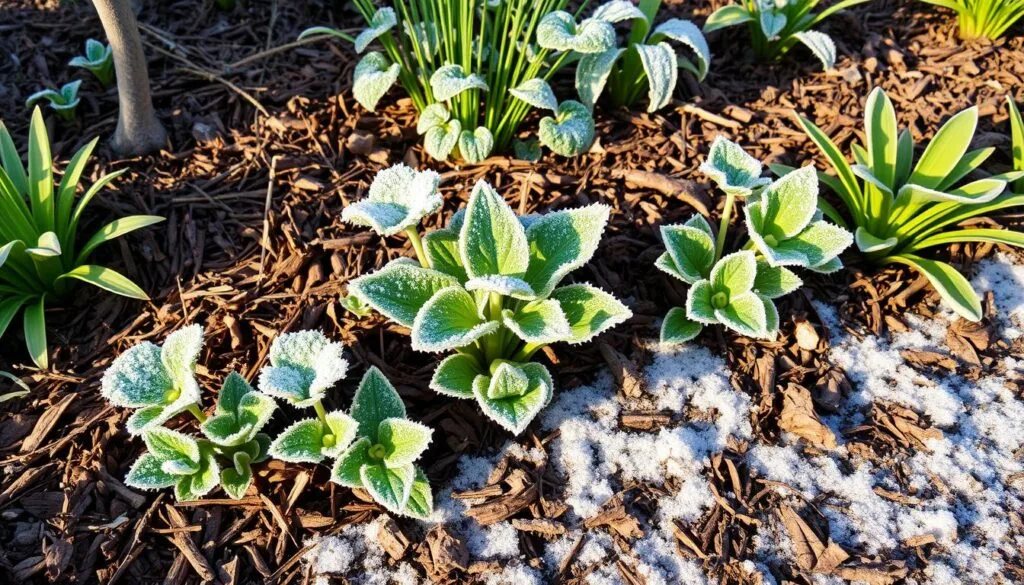
Soil Testing and pH Adjustment for Winter Success
Getting your georgia winter garden soil ready for winter is more than just picking hardy plants. It’s important to test your soil regularly. This helps your plants do well during the winter. Knowing your soil’s nutrient levels and pH lets you make the right changes.
When and How to Test Soil
The best time to test your georgia soil amendments for winter is in the fall or early spring. This is before you start planting. Soil test kits are available at extension offices, university labs, or online.
- Take soil samples from different parts of your garden, avoiding odd spots like under eaves or near compost piles.
- Use the test kit as directed to get accurate results.
- Send the samples to a trusted lab for analysis.
Correcting Soil Deficiencies
The test results will show your soil’s nutrient levels and pH. If there are any issues, you can fix them with the right amendments.
- Adjust pH: Add lime if your soil is too acidic; use sulfur if it’s too alkaline.
- Supplement Nutrients: Use organic matter, compost, or specific fertilizers for nutrient needs.
Make sure to add amendments before planting. This lets the soil adjust. Regular testing and adjustments will help your georgia winter garden soil support your plants all winter.
Winter Plant Selection Based on Soil Types
Choosing cold-hardy plants georgia for your winter garden depends on your soil. Knowing your soil’s characteristics helps pick the best georgia winter plant selection. This ensures your plants will do well in the cold.
Georgia’s varied climate and soil types offer many options for winter gardening. In areas with good-draining, rich soil, try planting spinach, Swiss chard, carrots, and radishes. These veggies enjoy the mild winter and get sweeter with frost.
If your garden has clay-based soil, choose plants like kale, broccoli, and cabbage. These hardy greens and brassicas love Georgia’s cooler weather. They taste better after a light frost.
- Spinach, Swiss chard, and carrots thrive in well-draining, nutrient-rich soils.
- Kale, broccoli, and cabbage adapt well to heavier, clay-based soils.
- Radishes and peas are low-maintenance, fast-growing winter crops suitable for Georgia’s climate.
When picking cold-hardy plants georgia, think about your location’s microclimate. Sheltered spots can grow more plants, while exposed areas need tougher varieties. By matching your soil and microclimate to the right georgia winter plant selection, you’ll have a great winter garden in Georgia.
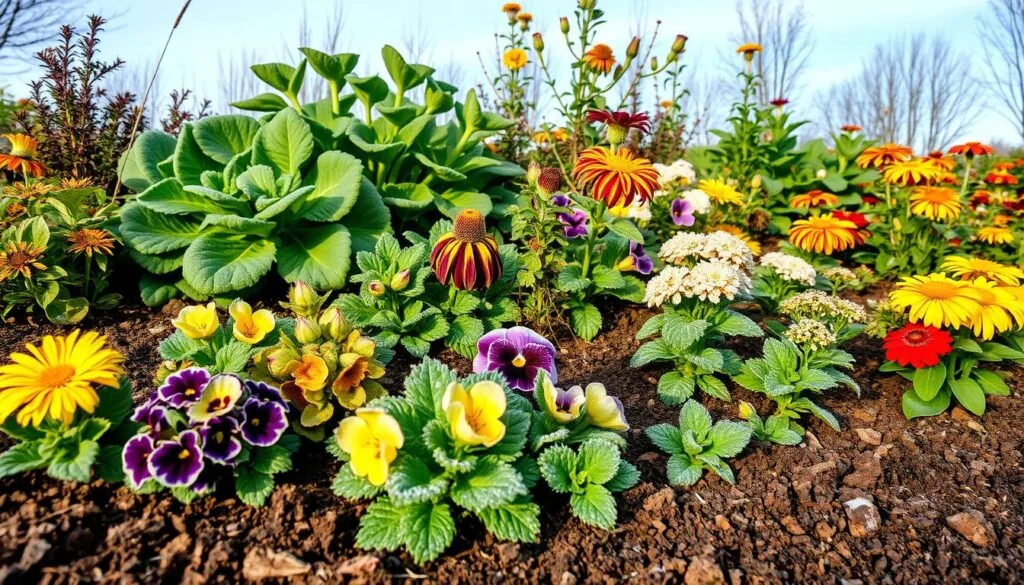
| Soil Type | Recommended Cold-Hardy Plants |
|---|---|
| Well-draining, nutrient-rich | Spinach, Swiss chard, carrots, radishes |
| Heavier, clay-based | Kale, broccoli, cabbage |
“By carefully matching your soil types and microclimates to the right georgia winter plant selection, you can create a thriving and bountiful winter garden in Georgia.”
Site Preparation and Planting Techniques
Getting your planting sites ready is key for a successful winter garden in Georgia. Start by digging holes that are twice as wide as the root ball. Make them deep enough to fit the roots comfortably. Angle the sides of the hole upwards to help the roots grow outwards.
Proper Planting Depth Guidelines
It’s important not to bury plants too deep. Plant them at the same depth as their root ball was in the container. Planting too deep can cause root rot and slow growth. Make sure to check the planting depth for each plant to get the best results.
Soil Temperature Considerations
Soil temperature is crucial for your winter plants in Georgia. Some plants need cooler soil to start, while others prefer warmer. Find out what temperature your plants need and plant at the right time for the best start.
By preparing your sites well, following the right depth guidelines, and thinking about soil temperature, you can make your winter garden in Georgia thrive. With the right techniques and care, you’ll have a vibrant winter landscape.
Conclusion
Successful winter gardening in Georgia needs the right soil, plants, and care. Follow the tips in this article for soil, mulching, and protecting plants. This way, your winter garden will flourish, even in tough weather.
Using the best soil for winter plants in Georgia and following local gardening tips will help. Always test your soil, add needed nutrients, and shield your plants from frost. With these steps, your winter garden in Georgia will be vibrant and productive.
Soil preparation and ongoing care are crucial for a thriving winter garden in Georgia. By keeping your soil healthy and rich in nutrients, you’ll get a stunning winter landscape. This will reward you for many seasons ahead.
FAQ
What is the best soil for winter plants in Georgia?
What soil amendments are crucial for winter gardening in Georgia?
How do I protect my plants from the harsh Georgia winter?
How do I manage soil moisture for my winter garden in Georgia?
When and how should I test my soil for winter gardening in Georgia?
What types of winter plants are best suited for Georgia’s climate and soil conditions?
Source Links
- Top 5 Beginner-Friendly Winter Cover Crops – https://www.bootstrapfarmer.com/blogs/backyard-gardening/beginner-friendly-winter-cover-crops?srsltid=AfmBOorLc_2Q_26LeVQnOfuxh1eLJU9P1QR1zC1PU2P-v7nnzycoQqka
- Winter sowing: An Easy, Low-Cost Technique for Starting Seeds – https://savvygardening.com/winter-sowing/
- Fall great time for planting in Georgia landscapes – https://newswire.caes.uga.edu/story/2342/get-to-work.html
- Growing Winter Garden Plants: A Complete Guide – https://kissanshop.com/winter-garden-plants/
- Preparing Your Lawn and Landscape for Winter in Atlanta, Georgia – https://www.thedreamscapes.com/blog/preparing-your-lawn-and-landscape-for-winter-in-atlanta-georgia
- Planting Calendar for Atlanta, GA – https://www.almanac.com/gardening/planting-calendar/ga/Atlanta
- Planting Trees and Shrubs | Middle Georgia Gardener – https://site.extension.uga.edu/gardener/2024/03/planting-trees-and-shrubs/
- Strategic Winter Garden Preparation Techniques – https://gloverlandscapes.com/winter-garden-preparation-techniques/
- 19 Fall Gardening Practices That Will Enrich Your Soil in Winter – https://www.bobvila.com/articles/improve-garden-soil-in-winter/
- Winter Soil Care Guide for Raised Garden Beds – https://www.vegega.com/blogs/gardening-tips/winter-soil-care-guide-for-raised-garden-beds?srsltid=AfmBOorm3PywazHR3mu_vgrRXS1DSE_TWV5MKina7mYNnsTRB6ttWpfI
- The Benefits of Mulching in Atlanta’s Winter Months, Atlanta, GA – https://www.thedreamscapes.com/blog/the-benefits-of-mulching-in-atlanta-winter-months
- Mulching In The Garden: Why, How, and When! – https://www.azurefarmlife.com/farm-blog/mulching-in-the-garden
- Opinion: Protect plants from cold damage with these essential strategies – https://www.appenmedia.com/opinion/opinion-protect-plants-from-cold-damage-with-these-essential-strategies/article_40cac3a8-ab69-11ef-8b15-2b78b95ee40c.html
- Winter-Proofing Your Garden: Top Cold-Tolerant Container Plants – Bootstrap Farmer – https://www.bootstrapfarmer.com/blogs/backyard-gardening/winter-proofing-your-garden-top-cold-tolerant-container-plants?srsltid=AfmBOoo2uxfqFGWDeg3f8hTmFVOwyHgVuS4n-ql8R0Izktphf80y9WTf
- Brr! Protecting Your Garden From Frost – https://www.almanac.com/protecting-your-garden-frost
- How to Protect Our Lake Oconee Landscaping This Winter – https://www.paxisgroup.com/blog/how-to-protect-our-lake-oconee-landscaping-this-winter
- Atlanta freeze warning: How and when to cover plants – https://www.ajc.com/things-to-do/atlanta-winter-guide/how-and-when-to-cover-plants-during-cold-weather/GMGIMANNWYMLLVJ3GS7YMWNZVY/
- When Is the Best Time of Year for a Soil Test? – https://www.familyhandyman.com/article/when-to-test-soil/?srsltid=AfmBOooB4UykGP756kWgB2tmG0lSjm9l8YGBiS2QKB_0x5UORySwKCcP
- Winter Soil Care Guide for Raised Garden Beds – https://www.vegega.com/blogs/gardening-tips/winter-soil-care-guide-for-raised-garden-beds?srsltid=AfmBOopFB_ZwEGgw4WOHofBS4fmtNFmqQbPPW9-XNsm4C-7r4HoxBulI
- The Gardening Off-Season Is a Good Time to Work on Soil Quality – https://www.morningagclips.com/the-gardening-off-season-is-a-good-time-to-work-on-soil-quality/
- Zone 7 – Monthly Garden Calendar: Chores and Planting Guide – https://sowtrueseed.com/blogs/monthly-garden-schedule-by-zone/zone-7-monthly-garden-calendar-chores-and-planting-guide?srsltid=AfmBOoo-FIqauE4H3Pxfor2yqdhA0Z-UiN3O4vqAWIa7ahpzctZynf68
- Winter Sowing Seeds: What is it and how to do it – https://seedsnsuch.com/blogs/gardeners-greenroom/winter-sowing-seeds-what-is-it-and-how-to-do-it
- 9 Vegetables To Plant in Winter – https://www.familyhandyman.com/list/vegetables-to-plant-in-winter/?srsltid=AfmBOorHVF-SUSUf-s-lluks9Fkqh8kROliZkbZmQsEams0GDfmFeiXG
- 10 Tips for Preparing Your Garden for Winter – https://www.almanac.com/10-tips-preparing-your-garden-winter
- Winter-Proofing Your Garden: Top Cold-Tolerant Container Plants – Bootstrap Farmer – https://www.bootstrapfarmer.com/blogs/backyard-gardening/winter-proofing-your-garden-top-cold-tolerant-container-plants?srsltid=AfmBOorMP2u3tZxdK6ScEVC2JvgKd3bPUCUuBnlj6eVxvITOwCYJkE5I
- Top 5 Beginner-Friendly Winter Cover Crops – https://www.bootstrapfarmer.com/blogs/backyard-gardening/beginner-friendly-winter-cover-crops?srsltid=AfmBOoocpHDVzIda9EkqNPrFR_LCeBxu23Tj4YM40uCyTogD3l9GnUVP
- Winter Soil Care Guide for Raised Garden Beds – https://www.vegega.com/blogs/gardening-tips/winter-soil-care-guide-for-raised-garden-beds?srsltid=AfmBOoqrOsyugtXoq7g1gnE4hcaCc5vRJe74gH4hobpTHJvdbEwcXnlf
- Top 5 Beginner-Friendly Winter Cover Crops – https://www.bootstrapfarmer.com/blogs/backyard-gardening/beginner-friendly-winter-cover-crops?srsltid=AfmBOooZuBONAe4sItudg7hZipXO1pvrUBI2Rl7OCYiPCLSHEgk1n0lV
There are no reviews yet. Be the first one to write one.




